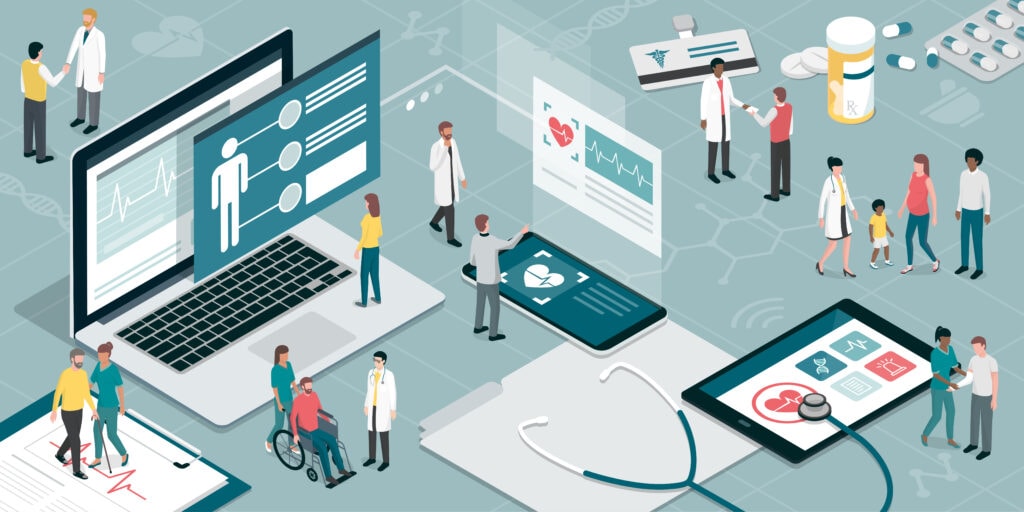Healthcare is one of the largest industries in the world, and the vast scale of it results in enormous amounts of information being generated every day. Much of the industry now uses computer systems for most of its operations, but physical paperwork is, nonetheless, still very common.
Unfortunately, paperwork is also extremely inefficient. It takes up large amounts of physical space, it’s hard to manage and retrieve, and it’s also often difficult to decipher, among other issues. The answer to all of this is digitization, but this brings with it its own challenges.
The most common methods of digitization are manual copying of data by employees and the use of basic optical character recognition (OCR) software. The former is time-consuming, expensive, and prone to errors, while the latter is often even less accurate and can generally only be used effectively with a limited number of simple document types.
An effective way to get around these issues with digitization is to utilize more advanced OCR for healthcare that uses AI technology. This kind of enhanced OCR software can completely revolutionize the way healthcare organizations manage their digitization, making it simultaneously more efficient and more accurate.
In this article, we look at how AI-based OCR can improve the digitization process for the healthcare industry and how it could benefit your organization directly.
What is OCR for healthcare and how is it enhanced by AI?
Healthcare OCR is fundamentally very similar to any other form of OCR, only it is applied in the context of healthcare. This means it is used to process and digitize the information, usually text-based, from medical records, invoices, and any other kind of healthcare-related documentation.
As mentioned above, basic OCR for healthcare is limited in its usefulness by the fact it can only work well with some document formats, and it often suffers from even lower accuracy rates than found with manual data transfer. This is a serious problem in the context of healthcare where people’s lives and health can be dependent on the accuracy of data. However, AI technology can be built into OCR software to enhance its effectiveness, making it much more useful to healthcare organizations.
How can AI-based OCR benefit healthcare?
Eliminate physical documents
Accumulating large quantities of physical documents was once a necessity for healthcare organizations. Now, it is an unnecessary burden, with digital storage providing a more efficient way to hold large amounts of important data. This can make life easier for healthcare workers, save space, and reduce the wastage associated with paper documentation.
Faster digitization of large amounts of data
A huge benefit of AI-enabled OCR software is that it is able to digitize documents far more rapidly than humans. This helps organizations stay on top of the digitization process and immediately digitize large quantities of information.
Under normal circumstances, surges in the amount of paperwork being generated cause backlogs of paperwork. AI-powered OCR, on the other hand, can handle huge amounts of information at once, preventing these backlogs from ever forming.
More accurate data transfer
An ever-present challenge posed by digitization in the healthcare industry is inaccuracy. In any industry, accurate data is desirable, but it is particularly important for healthcare, where people’s lives and wellbeing can be in the balance.
AI-based OCR can achieve superior rates of accuracy compared with both non-AI OCR and manual data transfer, making it the obvious choice for many healthcare organizations concerned with accuracy.

Easier storage, retrieval, and sharing of data
Digital storage is intrinsically more space-efficient than physical storage, making it far simpler for organizations to handle the large quantities of information they generate through their daily operations. Beyond these space-saving benefits, digital data storage makes categorization and retrieval much simpler for healthcare workers, saving them time and effort.
Finally, digital data can be shared quickly and easily, either within the same building, across the planet, or anywhere in between, making it more useable for healthcare operators working across widespread locations or collaborating with other firms.
Less work for healthcare employees
Healthcare professionals are some of the hardest-working employees in any industry, and that is doubly true in times of high demand such as during the Coronavirus pandemic. Paperwork only adds to this workload, with manual scanning of documents, filing by hand, and more all taking up valuable time for many workers.
Digitization, enabled by AI-based OCR technology, can dramatically cut down the need for this type of work, reducing the workload for busy staff and helping them to spend more time on other important work.
Digitization of complex and unique documents
In comparison to other methods of document digitization such as manual transfer by employees or more primitive OCR software, AI-powered OCR can effectively comprehend and digitize a greater range of document types. Not only does the AI enhance the functionality of the software to recognize more documents, but it can be pre-trained for compatibility with even the most unique and complex documents in any healthcare setting.
How can Digitise.AI help your healthcare organization?
The Digitise.AI platform uses sophisticated AI to digitize the information from physical documents, including healthcare-related documents such as medical records, invoices, and much more.
We can pre-train our algorithms to order to ensure the platform will recognize and accurately digitize all relevant information from any specific document, however complex, right out of the box.
With Digitise.AI, you can count on higher accuracy than found with the average manual transfer or with more basic OCR software. Talk to our team today to book a demo and see how AI could help your organization automate the digitization process.
Learn more about healthcare document digitization for your organization
